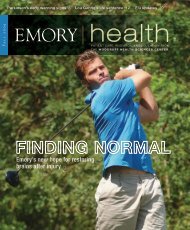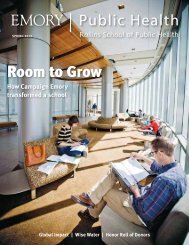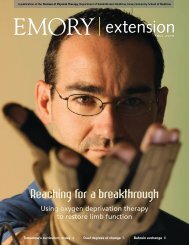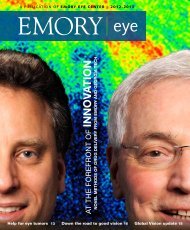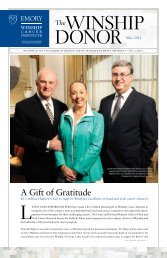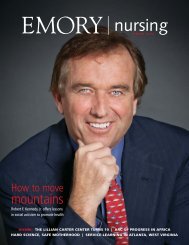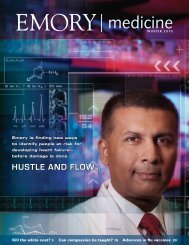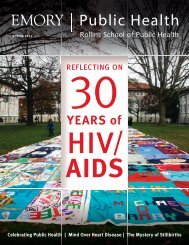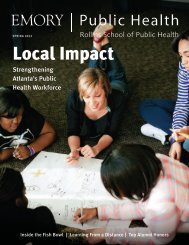returning quality to life - Woodruff Health Sciences Center - Emory ...
returning quality to life - Woodruff Health Sciences Center - Emory ...
returning quality to life - Woodruff Health Sciences Center - Emory ...
Create successful ePaper yourself
Turn your PDF publications into a flip-book with our unique Google optimized e-Paper software.
FEATURE THE UNIVERSITY/HIGH SCHOOL CONNECTION<br />
INTRO TO HANDS-ON RESEARCH<br />
Lab lessons<br />
Casey Woodward first discovered “the<br />
wonder” of the labora<strong>to</strong>ry during a<br />
summer research program at <strong>Emory</strong>’s<br />
Winship Cancer Institute.<br />
Woodward is one of 70 local high<br />
school juniors who have participated<br />
in the seven-week program, started<br />
by local high school teacher Andrea<br />
Allio 10 years ago. In fact, Woodward<br />
returned <strong>to</strong> Winship each summer<br />
during her undergraduate years <strong>to</strong><br />
work with <strong>Emory</strong> oncologist Mary Jo<br />
Lechowicz, her men<strong>to</strong>r and the program’s<br />
current organizer.<br />
“My family didn’t have much of a<br />
medical background, and getting <strong>to</strong><br />
work as part of the medical community<br />
was really valuable,” says Woodward,<br />
currently a medical student at the<br />
University of Pennsylvania. “It helped<br />
me understand how much we know and<br />
how much we don’t.”<br />
The program’s faculty consider<br />
the students as full members of the<br />
lab team. They engage in hands-on<br />
STIMULATING SCIENCE INTEREST EARLY<br />
Building a<br />
science pipeline<br />
14<br />
EMORY HEALTH<br />
research, take field trips <strong>to</strong> various<br />
departments throughout Winship and<br />
<strong>to</strong> patient simulation labs in <strong>Emory</strong>’s<br />
medical school, and become grounded<br />
in published articles on cancer biology.<br />
Currently, organizers are planning<br />
opportunities for high school teachers <strong>to</strong><br />
share a role in the program.<br />
Brahma Natarajan, now a senior at<br />
McIn<strong>to</strong>sh High School in Peachtree City,<br />
worked in Winship biochemist Anita<br />
The high school seniors gathered in<br />
the cardiology unit at Grady Memorial<br />
Hospital got a close-up, hands-on lesson<br />
about their own hearts one afternoon<br />
this past fall. Led by <strong>Emory</strong> cardiologist<br />
and Grady cardiology chief Allen<br />
Dollar, a group of sonographers showed<br />
how echocardiography worked using<br />
several of the students as patients. “So,<br />
is this the same as ultrasound for a<br />
baby?” asked one student.<br />
The class is part of the Pipeline program,<br />
started four years ago by two<br />
<strong>Emory</strong> medical students, Sam Funt<br />
and Zwade Marshall, at South Atlanta<br />
School of <strong>Health</strong> and Medical <strong>Sciences</strong>.<br />
Corbett’s lab last summer, studying the<br />
yeast cousin of a protein thought <strong>to</strong> be<br />
involved in human breast cancer. Two<br />
graduate students in the lab taught her<br />
how <strong>to</strong> run gels, perform Western blots,<br />
and create mutations in proteins.<br />
“Now that I have experienced how<br />
a lab works, I have gotten excited<br />
about continuing research in college,”<br />
says Natarajan. “I can’t wait!” —Quinn<br />
Eastman<br />
School officials credit Pipeline with stimulating<br />
interest in health science careers<br />
at South Atlanta as well as bolstering<br />
attendance and academic performance.<br />
Beginning with a single class, the<br />
program has expanded <strong>to</strong> include<br />
classes for sophomores, juniors, and<br />
seniors. Each grade level has access <strong>to</strong><br />
a distinct curriculum with a classroom<br />
component, one-on-one men<strong>to</strong>ring by<br />
<strong>Emory</strong> undergraduates, and hands-on<br />
demonstrations. Sophomores explore<br />
infectious diseases and HIV/AIDS. Juniors<br />
study neuroscience. And seniors—who<br />
get help with college application coaching—focus<br />
on cardiology and commu-



